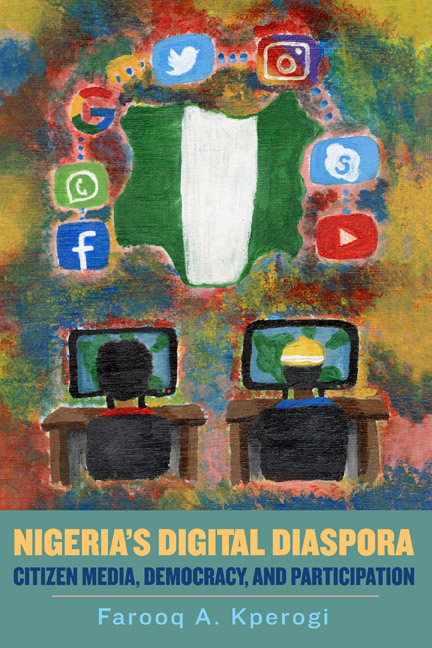Book contents
- Frontmatter
- Dedication
- Contents
- Acknowledgments
- Introduction
- 1 Citizen and Alternative Journalism: Mapping the Conceptual Contours
- 2 The Nigerian Press: From Colonial Evangelism to Guerrilla Journalism
- 3 The Nigerian Digital Diasporic Public Sphere
- 4 Profiles of Diasporic Citizen Media Sites
- 5 From the Diaspora to the Homeland: Role Reversal in News Flows
- 6 The Nigerian Government’s Response to the Diasporic Citizen Media
- 7 Domestic Online Media, Social Networked Journalism, and Participation
- 8 Mainstreaming of Diasporic Citizen Journalism and Implications for Nigerian Journalism
- Notes
- Bibliography
- Index
3 - The Nigerian Digital Diasporic Public Sphere
Published online by Cambridge University Press: 13 April 2021
- Frontmatter
- Dedication
- Contents
- Acknowledgments
- Introduction
- 1 Citizen and Alternative Journalism: Mapping the Conceptual Contours
- 2 The Nigerian Press: From Colonial Evangelism to Guerrilla Journalism
- 3 The Nigerian Digital Diasporic Public Sphere
- 4 Profiles of Diasporic Citizen Media Sites
- 5 From the Diaspora to the Homeland: Role Reversal in News Flows
- 6 The Nigerian Government’s Response to the Diasporic Citizen Media
- 7 Domestic Online Media, Social Networked Journalism, and Participation
- 8 Mainstreaming of Diasporic Citizen Journalism and Implications for Nigerian Journalism
- Notes
- Bibliography
- Index
Summary
Diasporas are ethnoscapes formed by people who voluntarily or involuntarily deterritorialize from their homelands and reterritorialize in new environments. They conceive of themselves as being “outside the state but inside the people.” The fact of this emotional investment in the homeland in spite of geographic distance from it displaces the importance of territorial boundedness in the constructions of notions of citizenship and political participation. Although diasporas have traditionally been historicized as congeries of people who exist on the fringes of the societies in which they have reterritorialized, there is significant research that point to the central roles diasporas play in influencing domestic and global politics, shaping identities, reconfiguring notions of community and peoplehood, and navigating the contours of the global economy. In other words, in the age of globalization and the death of distance that the Internet has enabled, territorial displacement does not necessarily sentence ethnoscapes to what Adbelmalek Sayad has called “double absence.” Instead, it can activate manifold manifestations of presence, especially with the unceasingly dizzying proliferation of the “technologies of presence” and the logic of “connected presence” this reality enhances. Although diasporas have inspired changes in the domestic policies and politics of their homelands and instigated change of government, they can also be agents of instability. Nonetheless, the increasingly central roles that diasporas play in homeland politics has caused Robin Cohen to observe that they have moved “from victims to challengers.”
Digital diasporas, which are not delimited by national boundaries, have also emerged as core constituents of the structures and processes of the contemporary phase of globalization. Exilic elites of several countries have transformed the Internet into electronic agoras for transformative dialogic encounters with their homeland and with their current places of residence. Marshall McLuhan and Bruce Powers unwittingly foretold digital diasporas in their book The Global Village: Transformations in World Life and Media in the 21st Century, when they pointed out that “electronic technologies have begun to shake the distinction between inner and outer space, by blurring the difference between being here or there.” Although they were celebrating the nascence of visual technologies that dissolved the limitations of time and space, their insights are relevant to the conception of digital diasporic public spheres, which dissolve, or at least complexify, the differences between home and abroad in deliberative encounters.
- Type
- Chapter
- Information
- Nigeria's Digital DiasporaCitizen Media, Democracy, and Participation, pp. 64 - 79Publisher: Boydell & BrewerPrint publication year: 2020



